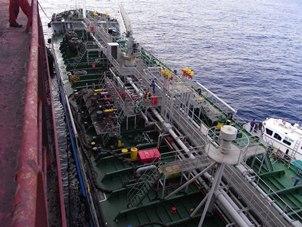
Steamship Mutual
Published: March 01, 2012

In the recent Commercial Court decision in Eitzen A/S v TTMI Sarl [2012] EWHC 202 (Comm) the interpretation of Clause 15 of the SHELLTIME 4 form charterparty, was considered. The clause provides a regime for payment of bunkers at the time of delivery and at redelivery. The construction of the wording of this clause was the subject of dispute between the parties. This was because charterers (“Eitzen”) had sub-chartered the vessel (“the first sub-charter”). Under the first sub-charter payment for bunkers both ends was agreed at fixed prices. Therefore, upon redelivery Eitzen paid the fixed price agreed for the remaining bunkers on board.
There remained a short unexpired period of time under the head charter at the conclusion of the first sub-charter. Agreement was reached for the disponent owners (“TTMI”) to re-let the vessel from Eitzen for one time charter trip (“the second sub-charter”) with redelivery under that charterparty to be automatic and simultaneous with redelivery under the head charter.
The relevant term of the second sub-charter as regards bunkers on redelivery was:
“BUNKERS: VSL TO REDELD WITH BUNKERS AS PER REQUIREMENTS OF CURRENT PERIOD C/P”.
Regarding all other matters, including bunkers on delivery:
“OWISE TERMS AND CONDS AS PER HEAD C/P.”
Consequently there arose a dispute about the prices to be paid for bunkers on redelivery under the second sub-charter and under the head charter.
Regarding redelivery under the second sub-charter, TTMI argued that the reference to the “current period C/P” meant the provisions of the first sub-charter. Thus TTMI contended that on redelivery by them under the second sub-charter Eitzen was liable to pay them the fixed prices provided for in the first sub-charter. Eitzen disputed this and argued that the “current period C/P” referred to the head charter. The tribunal rejected this and that question was not appealed to the Commercial Court. However it is relevant to understand the substance of the appeal.
In terms of the price payable on redelivery under head charter, TTMI maintained that the words “price actually paid” in clause 15 meant the prices they actually paid for the bunkers that had been put on board and remained on board at redelivery on a first-in-first-out basis. As such, their case was that on redelivery under the head charter their obligation was to pay Eitzen these prices for the bunkers. The tribunal accepted this argument and this part of the Award was the subject of the appeal.
The net effect of the tribunal’s decision was that upon the simultaneous conclusion of the head charter and the second sub-charter, Eitzen was obliged to pay TTMI significantly more for the bunkers than TTMI was required to pay Eitzen.
On appeal Eitzen’s case was that the words “price actually paid” in clause 15 meant the price actually paid by the party seeking reimbursement under clause 15 upon redelivery. TTMI countered by maintaining that it meant the price paid to the bunker suppliers when stemmed. Where the bunkers are stemmed by the party seeking reimbursement under clause 15 the wording of the clause causes no issues as the end result is the same. However, where a party buys bunkers under one charterparty and then redelivers the same bunkers under clause 15 in a SHELLTIME 4 charterparty the two interpretations will give different results. It was, therefore, necessary for the court to determine, in such cases, whether the party seeking reimbursement is entitled to the price actually paid by him, or the price paid by a third party when the bunkers were stemmed.
In support of its case Eitzen put forward three main arguments. The first being that clause 15 is unworkable when given the meaning attributed to it by the tribunal. This is premised on the basis that clause 15 requires that “prices are to be supported by paid invoices.” Eitzen argued that such invoices will not usually be in the possession of or under the control of the charterer under the head charter but instead the third party to whom the invoices were issued when stemmed. The court dismissed this argument on the grounds that hearing the appeal on a point of law pursuant to s. 69 of the Arbitration Act 1996 did not permit it to delve into the tribunal’s conclusion on that point. Incidentally, the tribunal had disagreed with Eitzen’s argument on this point and suggested that, whilst perhaps difficult at times, it would not be impossible to obtain the relevant invoices.
The second argument was that clause 15 is intended to provide reimbursement and so “price actually paid” means the price paid by the party seeking reimbursement. This issue was the principle focus of Eitzen’s appeal. The essential point of this argument was that clause 15 is designed to eliminate the scope for profit or loss making on prices paid for bunkers upon redelivery. They highlighted that where bunkers purchased by a subcharterer are redelivered under the subcharter then again under the head charter the owner under the head charter would pay the “price actually paid” by the charterer seeking reimbursement. Thus having the effect that the charterer will make no profit or loss upon redelivery under the head charter.
Whilst acknowledging that this was a persuasive argument, the Court disagreed with this interpretation. The Court held that it would be “unbusinesslike” for a head owner to be taken to have agreed to pay a price for bunkers on redelivery over which they have no control and that may not be related to the price actually paid to the bunker supplier or any market price. Furthermore, and most significantly in terms of reaching its conclusion, the Court held that the requirement for “first-in-first-out” refers to the physical act of stemming bunkers and the wording links the price to that physical transfer of fuel i.e. the price paid for the fuel being taken in at a given time.
The third argument put forward by Eitzen was based on the legal principle of estoppel. Eitzen contended that there was agreement between the parties as to the meaning of the term “price actually paid” in the context of delivery under the head charter and subcharter. Therefore, in the context of redelivery, TTMI should be estopped from relying on a definition that meant the price paid when the bunkers were stemmed.
In dismissing this argument the Court noted an absence of evidence from Eitzen to support their contention that there was a mutual understanding of the meaning of the phrase. By contrast TTMI had adduced witness evidence, which was accepted by the tribunal, which indicated there was no such mutual understanding as to the definition of the phrase in the context of redelivery.
In summing up, the Court confirmed that it agreed with the decision of the tribunal “principally because of the specific requirement in clause 15 for a “first-in-first-out” assessment.” The Court went further by stating definitively that as a point of law:
“In clause 15 of the SHELLTIME 4 form the words “price actually paid” mean the price paid when the bunkers were stemmed.”
Article by Gareth Thompson


